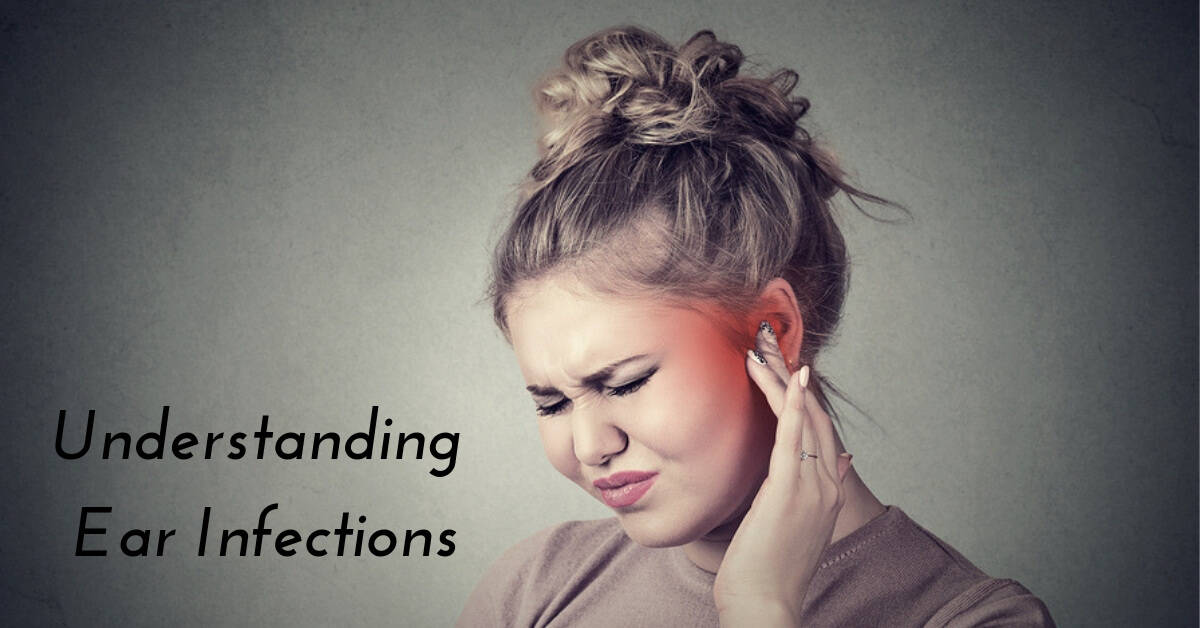Hearing loss is caused by a number of different reasons, ranging from aging to noise induced to heredity reasons. These causes impact the auditory nerve, which carry information between the cochlea and the brain and could lead to sensorineural hearing loss, the most common type of hearing loss.
Another type of hearing loss is called conductive hearing loss, which occurs when there is build up and obstruction to the eardrum. One culprit for this type of hearing loss is ear infections. Knowing more about ear infections and how it may impact your hearing is important in assessing your overall hearing health.
Types of Ear Infections
There are three main types of ear infections, and each one is dependent on where the infection is located – the outer, middle, or inner ear. Outer ear infections are known as “swimmer’s ear” where liquid is trapped in the ear canal, unable to get out properly, and susceptible to potential infection. Middle ear infections occur in the inside the eardrum in the middle area of the ear. Inner ear infections lie deep within the ear canal and can cause severe symptoms such as dizziness or vertigo.
Ear Infections is More Than Just Ear Pain
Ear infections will undoubtedly cause pain in your ear, but they also lead to other symptoms that you should be aware of. Ear infections may cause headaches, nausea, vomiting, and even fevers. More severe symptoms may be temporary or permanent hearing loss. Temporary hearing loss is common is due to blockage in the ear canal. More serious though is permanent hearing loss which results from repeated hearing loss which ultimately scar the eardrum, impacting hearing permanently.
Symptoms of Ear Infections
Ear infections can impact anyone, from infants to teens to adults and seniors. Among adults, they are able to recognize and identify ear infections when experiencing it, but there may be challenges when it comes to babies, toddlers, young children, and sometimes seniors. As such, it is important to be able to tell certain signs of ear infections to be able to get treated to prevent any further damage to the ear. Among younger children, signs may include fever, constant pulling or scratching of the ears, delayed response to voices, irritability, and secretions from the ear. Among older children, adults, or seniors, symptoms of ear infections include constant earaches, increased pressure in the ears, difficulty in understanding speech, dizziness, nausea, or vomiting.
If you, your child, or a senior you know are exhibiting any signs mentioned above, it is important to seek out a healthcare professional. The longer you wait, the more damage it may cause in the ear, potentially leading to temporary hearing loss.
Ear Infections and Conductive Hearing Loss
The most common type of ear infections that cause hearing loss are the ones impacting the middle ear. The medical term for such ear infections is “otitis media”, where the infection can cause buildup of fluid. When this occurs, it creates difficulty for the eardrum and the ossicular chain – three small bones in your middle ear assisting in the hearing process – in working together to move sounds to the auditory nerve – bundle of nerve fibers that carry hearing information to the brain. When all of this occurs, it is a form of conductive hearing loss, where there is an obstruction in the middle ear. Any blockage, a buildup of wax or fluid, can prevent sounds from passing through the middle ear, ultimately creating conductive hearing loss.
Hearing Loss from Ear Infections are Often Temporary
The good news about ear infections and conductive hearing loss is that it is usually temporary and subsides upon treatment. Generally, your physician can prescribe your ear infections with antibiotics and if successfully treated can bring your hearing back to normal.
In instances where you have repeated ear infections, physicians or hearing health professionals may insert tubes in your ear to drain fluid. The extraction of buildup of fluid in the middle ear greatly relieves pain and pressure that comes with ear infections. More importantly, it can prevent the eardrum from rupturing from excessive buildup and pressure.
If you are in the small population of people who has had continued ear infections that have scarred the eardrum, hearing loss could potentially be permanent. If your hearing loss does not return due to this reason, it is best to seek out a hearing health professional to be recommended with hearing aids to improve hearing acuity.
What to Do If You Have Hearing Loss
If you or a loved one has trouble hearing, it is critical to have your hearing tested by a hearing professional. Our hearing health staff at Desert Valley Audiology will be able to identify the degree and type of hearing loss you may be experiencing and provide the best treatment options. Reach out to us at Desert Valley Audiology today!

